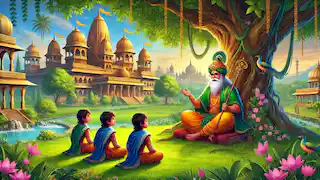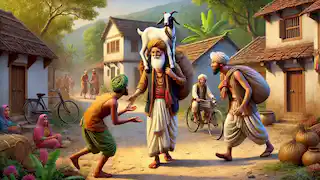The Panchatantra
Reading time: 8 min

About this story: The Panchatantra is a Fable from India set in the Ancient This Simple tale explores themes of Wisdom and is suitable for All Ages. It offers Moral insights. Timeless fables of wisdom and morality from ancient India.
Once upon a time, in the vast and diverse land of India, there lay a prosperous kingdom named Mahilaropya. The kingdom was known far and wide for its wealth, culture, and the wisdom of its people. However, the king of Mahilaropya, King Amarashakti, was deeply troubled. Despite his kingdom's glory, he worried about his three sons. They were kind-hearted but lacked the wisdom and understanding needed to rule the kingdom in the future.
To solve this dilemma, King Amarashakti summoned his ministers and advisors. "My sons are noble and brave, but they are unwise," he lamented. "They need to learn the art of ruling, and they need wisdom to guide them. But traditional education has not succeeded. We must find another way."
The ministers pondered over the problem until one of them suggested, "Your Majesty, there is a wise and learned man named Vishnu Sharma. He is known for his deep understanding of human nature and his ability to impart wisdom through stories. Perhaps he can help."
Intrigued and hopeful, King Amarashakti sent for Vishnu Sharma. When the sage arrived at the court, the king explained his predicament and requested his help. Vishnu Sharma listened attentively and then replied, "Your Majesty, I shall take on the task of educating your sons. I will teach them through stories that convey profound lessons and moral values. In six months, they will be wise enough to rule this great kingdom."
The king was delighted and immediately entrusted his sons to Vishnu Sharma. The sage took the princes to a quiet hermitage away from the distractions of the court. There, he began narrating stories, each rich with moral teachings and practical wisdom.
The Loss of Friends
The Monkey and the Crocodile
Once upon a time, there was a clever monkey who lived on a berry tree by a river. He was happy and content, enjoying the sweet berries and the serene surroundings. One day, a crocodile swam up to the tree and struck up a conversation with the monkey. The monkey, being kind and hospitable, offered the crocodile some berries. This gesture marked the beginning of their friendship, and the crocodile started visiting the monkey regularly.
As days passed, the crocodile began to take berries home for his wife. However, his wife grew jealous of the monkey and, cunningly, demanded that her husband bring the monkey's heart for her to eat. Torn between his loyalty to his friend and his love for his wife, the crocodile devised a plan to deceive the monkey.
One day, he invited the monkey to his home, saying, "Dear friend, my wife and I would like to invite you over for dinner. Please come with me." The monkey, trusting his friend, agreed and climbed onto the crocodile's back for the ride across the river.

As they reached the middle of the river, the crocodile began to sink. The monkey, sensing danger, asked, "What are you doing, my friend?" The crocodile, unable to lie any longer, confessed his wife's demand. The clever monkey quickly thought of a way out. He said, "Oh, my dear friend, why didn't you tell me earlier? I left my heart on the tree. Let's go back and get it."
The crocodile, believing the monkey, swam back to the tree. The monkey swiftly climbed to safety and declared, "You have betrayed our friendship. I will never trust you again." The crocodile, realizing his folly, swam away in shame, losing both a friend and his integrity.
Moral: A wise person should always be cautious and use their wit to escape from dangerous situations.
The Gaining of Friends
The Lion and the Mouse
In a dense forest, there lived a mighty lion, the king of the jungle. One day, as he was taking a nap, a little mouse ran over his paw. The lion woke up, angry and ready to crush the mouse. The terrified mouse pleaded for his life, saying, "Oh, great king, please spare me. I promise to repay your kindness someday."
The lion laughed at the thought of a tiny mouse helping him but decided to let him go. A few days later, the lion found himself trapped in a hunter's net. No matter how hard he tried, he couldn't free himself. Roaring in frustration, he caught the attention of the little mouse.
Remembering the lion's kindness, the mouse hurried to his aid. He began gnawing at the ropes with his sharp teeth, and soon the lion was free. The lion, humbled and grateful, said, "Thank you, little friend. You have saved my life. I will never underestimate anyone again."
Moral: Kindness is never wasted, and even the smallest creature can be of help to the mightiest.
Crows and Owls
The Crows and the Black Snake
In a banyan tree near a quiet village, there lived a family of crows. The crows were happy except for one problem – a black snake that lived at the base of the tree. The snake would often climb up and eat the crow's eggs, leaving the crows distressed.
One day, the king of the crows decided to seek help from his wise friend, the jackal. The jackal advised, "Friend, gather some valuable jewelry from the nearby palace and drop it into the snake's hole. The people from the palace will see it and come to retrieve their jewelry. When they see the snake, they will kill it."
Following the jackal's advice, the crows flew to the palace and picked up a valuable necklace. They dropped it into the snake's hole and waited. Soon, the palace guards arrived, searching for the stolen necklace. When they found the snake guarding it, they killed the snake and took back the necklace.
The crows were overjoyed and thanked the jackal for his wisdom. They lived peacefully ever after, without the threat of the black snake.

Moral: Intelligence and strategy can overcome even the most dangerous of threats.
Loss of Gains
The Tortoise and the Geese
By a beautiful lake, there lived a tortoise who was friends with two geese. They enjoyed each other's company and shared many happy moments. However, one year, a severe drought dried up the lake, and the geese decided to migrate to a more abundant place. The tortoise, unable to fly, was distressed at the thought of being left behind.
The geese, not wanting to abandon their friend, came up with a plan. They found a strong stick and told the tortoise to bite onto it firmly. The geese would then carry the stick in their beaks and fly, transporting the tortoise with them. The only condition was that the tortoise must not open his mouth during the journey, no matter what.
The tortoise agreed, and soon they were airborne. As they flew over a village, people below saw the unusual sight and started laughing and making comments. The tortoise, unable to resist responding to the taunts, opened his mouth to speak and fell to the ground, meeting a tragic end.
Moral: One must always heed wise advice and exercise restraint to avoid disastrous consequences.
Considered Actions
The Foolish Brahmin and the Crooked Thief
In a small village, there lived a poor but honest Brahmin who decided to perform a religious ceremony for good fortune. After the ceremony, he was gifted a goat as a token of gratitude. As the Brahmin carried the goat home on his shoulders, three cunning thieves saw him and devised a plan to steal the goat.
The first thief approached the Brahmin and said, "Why are you carrying a dog on your shoulders, O holy man?" The Brahmin, puzzled, replied, "This is not a dog; it's a goat."
The second thief then appeared and asked, "Why are you carrying a dead calf on your shoulders, Brahmin?" Confused, the Brahmin replied, "It's not a dead calf; it's a goat."
Finally, the third thief came and said, "Why are you carrying a donkey on your shoulders?" By now, the Brahmin was thoroughly bewildered and thought he must be under some curse to see the goat as something else. He dropped the goat and hurried away, leaving the thieves to take the goat.

Moral: One should not be easily swayed by the words of others and must trust their own judgment.
Vishnu Sharma continued to narrate these captivating tales, each filled with wisdom, morality, and practical lessons. The princes listened intently, absorbing the teachings and reflecting on the morals. Over time, they became wise and learned individuals, capable of ruling the kingdom with justice and intelligence.
King Amarashakti was overjoyed with the transformation of his sons. He expressed his gratitude to Vishnu Sharma, who humbly replied, "Your Majesty, these stories are but a means to convey the wisdom that lies within all of us. May your sons rule wisely and justly, guided by the lessons they have learned."
The kingdom of Mahilaropya thrived under the rule of the wise princes. The tales of the Panchatantra spread far and wide, imparting wisdom and moral values to generations, ensuring that the light of knowledge and virtue continued to shine brightly in the hearts of all who heard them.


















